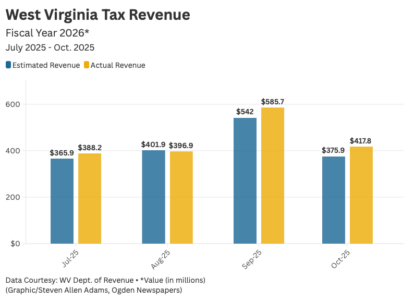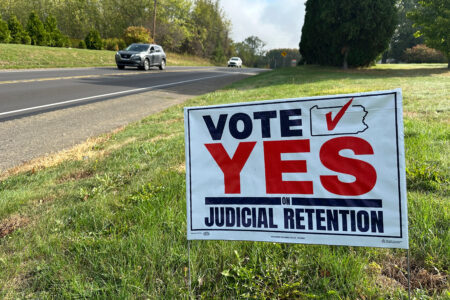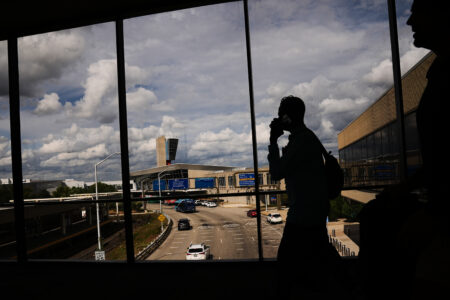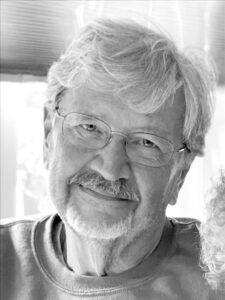Judge Could Rule on Legality of West Virginia National Guard Deployment to D.C. on Nov. 10
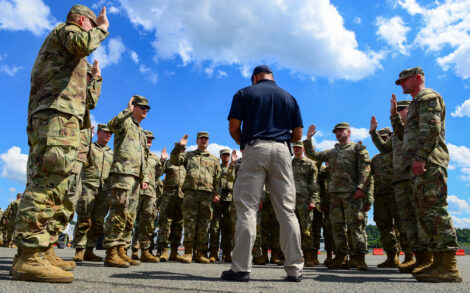
West Virginia National Guard soldiers recite the oath to become deputized to support to Joint Task Force – District of Columbia at Joint Base Anacostia-Bolling on Aug. 25. (Photo Courtesy of Army National Guard)
CHARLESTON — A decision from a Kanawha County judge regarding Gov. Patrick Morrisey’s deployment of members of the West Virginia National Guard to Washington, D.C., at the request of President Donald Trump could come as soon as next week.
During a hearing Monday morning, Eighth Judicial Circuit Judge Richard Lindsay converted a motion made by the ACLU-WV seeking a temporary restraining order into a motion for a preliminary injunction and continued the hearing until Monday, Nov. 10, at 2 p.m.
“The court also appreciates the…the strength of arguments for and against, and the work that’s been put into this particular question,” Lindsay said. “Again, this is a serious question for the public to consider.”
The ACLU-WV, representing the West Virginia Citizens Action Group, filed a lawsuit Aug. 21 against Morrisey and Maj. Gen. James Seward, the adjutant general of the West Virginia National Guard.
The lawsuit is seeking a temporary restraining order and a permanent injunction to block the recent deployment of the National Guard to Washington and a declaratory judgement that the deployment exceeds statutory and constitutional authority. The permanent injunction seeks to prohibit Morrisey from ordering the deployment of National Guard soldiers outside of the state and prohibit Seward from complying with unlawful directives to send National Guard units or civilian employees outside the state.
Trump announced a federal takeover of law enforcement functions in Washington on Aug. 11, citing instances of violent crime. Trump called up the D.C. National Guard, FBI, the Department of Homeland Security, and other federal agencies to help quell crime.
Trump also requested the assistance of states, asking them to send their own National Guard units. Trump cited United States Code Title 32 502(f), which allows the secretaries of the Army or Air Force to call up National Guard units from other states for training or other duties. This authority is used for national disasters or national security missions. Morrisey announced on Aug. 16 that he was sending between 300 and 400 personnel with the West Virginia National Guard to Washington.
“We still do have some people in D.C.,” Morrisey said last week during a press conference at the State Capitol Building. “I know that we’ve talked about potential numbers and how that may change.”
ACLU-WV Legal Director Aubrey Sparks argued that the use of Title 32 502(f) authority – where troops are federally funded but remain under state command – does not override the limitations imposed by State Code § 15-1D-1, which lists the conditions under which the Guard can be called into the “service of the state.”
“Military duty requires that the West Virginia National Guard be called into service of the state,” Sparks said. “So, even were the state permitted to call the National Guard for circumstances that happened extraterritorially, even if we set aside the legal concerns about that, they still would not be able to show that the 15-1D-1 statuses were triggered that would permit them to do so.
“It is pretty well established that the West Virginia National Guard are not law enforcement officers within the meaning of West Virginia law,” Sparks continued. “And so, that means when members of the National Guard go to D.C. and they engage in law enforcement activities, they’re only authorized to do so either under the authority of the state, which they would not have that authority. They are not given that authority when they leave state bounds or through their deputation by the U.S. Marshal Service.”
Assistant Attorney General Christopher Etheredge argued Monday that Morrisey maintains authority over the deployed National Guard members and was within his legal rights to provide assistance at the request of Trump.
“One of the justifications under West Virginia law that permits the governor to send troops out of state relies on a request from the executive authority,” Etheredge said. “Although under Title 32, West Virginia National Guard troops have been sent to D.C. for a federal mission, that does not mean that they’ve been federalized.”
The court heard expert testimony of Franklin D. Rosenblatt, a retired Army Judge Advocate General lieutenant colonel and military law professor on behalf of the ACLU-WV over the objections of the state. He argued that a governor retains exclusive operational command and control under Title 32, meaning that Guard members remain bound by its respective state’s laws.
“There must be one ultimate shot caller who sets the mission,” Rosenblatt said. “And so, it’s not that you’re under the operational control of both the president and the governor. It’s got to be one.”
Lindsay permitted the parties in the case to file additional briefs on or before Wednesday, before next Monday’s hearing.
“The essential … question is whether or not what the governor did herein is lawful or unlawful,” Lindsay said. “And this court is of the belief that must be answered in order to determine whether or not, for example, there is harm.”

